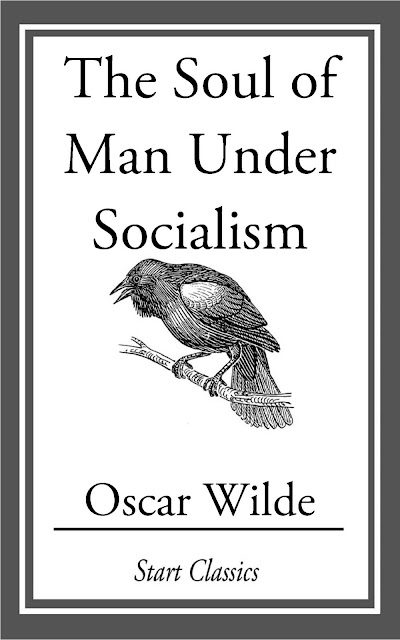When he wrote this essay, first published in 1891, Oscar Wilde was very optimistic about the ability of socialism to rid society of poverty, and advanced machinery to rid society of burdensome toil. Or was he? I don't know much about the context, but Wilde was a playful provocateur. Perhaps by taking the promises made by socialists and running with them, he was trying to expose the fallacies of their thinking and explore what really might be necessary for an improvement in society.
He claims that the chief advantage of Socialism would be rescuing us from having to be concerned about alleviating the hardships of others. Poverty might be ended without the need for charity, which is degrading to the recipient.
What he means by socialism is the abolition of private property. He is not simply talking about some extension of a state funded welfare system. Of course he is writing well before the horrors which attended so many experiments with communism in the twentieth century. So it is possible his optimism is genuine.
We think of socialism as the surrender of the individual to the collective. Irony is at the heart of Wilde's wit, and here the irony is that he takes the promised Utopia of Socialism and explains how it can only succeed if it leads to the full flowering of Individualism.
The reason to abolish private property is that its protection and maintenance distracts us from cultivating our Individuality. The more we are our property the less we are ourselves.
His vision of socialism is more like anarchism. All forms of authority will cease and along with them all forms of punishment.
He turns to the teachings of Jesus, which he presents also as a call to Individualism.
It is common for people to wrongly associate Jesus' teachings with Socialism. There is a huge difference between appealing to one's followers to voluntarily help the poor and advocating that the state should force them to do so. Wilde isn't saying that Jesus was a Socialist. He's merely saying that Jesus advocated Individualism and asserting the opinion that Socialism, if properly pursued, would lead to greater Individualism.
He adds that Individualism would end family life, but that this would make the love of a man and a woman more than it has been, the implication being that that which is enforced is less genuine. Again he appeals to Jesus' refusal to recognise the members of his own family.
In the latter part of the essay, Wilde turns to literary criticism to show how hard it is for Individualism to find acceptance in various written forms.
Wilde's take on things may tend to be unrealistic. He argues ending private property will end crime. But in the broad strokes of his thesis is much food for thought.
It makes sense that a peaceful, cooperative and loving society, if such a thing is possible, would have to be made up of those in whom Individuality has found an unhindered expression. We can see an apt analogy in nature. A thriving healthy group of plants or animals are those least impeded in following their instincts.
Is a society possible where everyone is free from impositions on their Individuality and yet cooperation allows for the practical solution of the problems facing the group?
I think so, but the process to get there will not be easy as the healthy loving impulses are often buried beneath much resentment.
The abolition of private property is impractical because it requires either the consent or the control of the masses. On the other hand, Wilde is right that Individualism is the answer. The way to achieve it is through a mixture of assertion and healing. Strength and soundness are needed to stand firm in the face of all that opposes it. This is where Wilde's pointing to Jesus is so relevant. We don't need screwed up people uninhibitedly living out their reckless disregard for the well-being of themselves or others. Of course, we might see that they are not Individuals, because they are more of a programmed expression of those who have damaged them than of their authentic self.
But we need a path of healing and it may be that the words of Jesus, rather than those of Socialists, have the ability to provide it.
Anyway, there is much to recommend Wilde's vision :
"For what man has sought for is indeed, neither pain nor pleasure, but simply Life. Man has sought to live intensely, fully, perfectly. When he can do so without exercising restraint on others, or suffering it ever, and his activities are all pleasurable to him, he will be saner, healthier, more civilised, more himself. Pleasure is Nature's test, her sign of approval. When man is happy, he is in harmony with himself and his environment."





